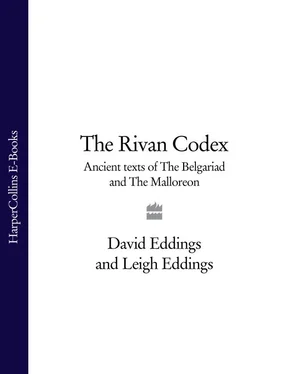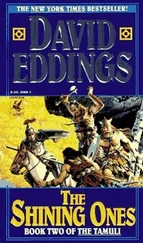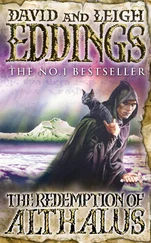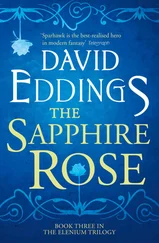Item six is our heroine – usually a wispy blonde girl who spends most of her time mooning around in a tower. I chose not to go that route, obviously. Ce’Nedra is a spoiled brat, there’s no question about that, but she is a little tiger when the chips are down. She turned out even better than I expected.
Item seven is a villain with diabolical connections. I invented Torak, and he served our purpose rather well. I even managed to give him a fairly believable motivation. Milton helped on that one. Torak isn’t exactly Lucifer, but he comes close. As usual, he has a number of evil underlings to do his dirty-work for him.
(Stay with me. We’re almost done.) Item eight is the obligatory group of ‘companions’, that supporting cast of assorted muscular types from various cultures who handle most of the killing and mayhem until the hero grows up to the point where he can do his own violence on the bad guys.
Item nine is the group of ladies who are attached to the bully-boys in item eight. Each of these ladies also needs to be well-defined, with idiosyncrasies and passions of her own.
And finally we come to item ten. Those are the kings, queens, emperors, courtiers, bureaucrats, et al who are the governments of the kingdoms of the world.
OK. End of list. If you’ve got those ten items, you’re on your way toward a contemporary fantasy. (You’re also on your way to a cast of thousands.)
All right then, now for a test: ‘Write an epic fantasy in no less than three and no more than twelve volumes. Then sell it to a publisher. You have twenty years.’ ( Don’t send it to me. I don’t have a printing press, and I do not read in the field. It’s a way to avoid contamination.)
STOP!! Do not uncover your typewriter, uncap your pen, or plug in your computer just yet. A certain amount of preparation might help. It’s a good idea to learn how to drive an automobile before you hop into the family car and take off for Los Angeles, and it’s probably an equally good idea to browse through a couple of medical texts before you saw off the top of Uncle Charlie’s head in preparation for brain surgery.
Let me stress one thing at the outset. This is the way we did it. This is not the only way to do it. Our way worked out fairly well, but others, done differently, have worked just as well. If you don’t like our way, we won’t be offended.
Now, of necessity, we get into a bit of biography. This introduction is designed to provide enough biographical detail to answer students’ questions and to provide a description of our preparations. I hope it satisfies you, because it’s all you’re going to get. My private life is just that – private – and it’s going to stay that way. You don’t really need to know what I had for breakfast.
I was born in Washington (the state, not the city) in 1931. (Go ahead. Start counting. Depressing, huh?) I graduated from high school in 1949, worked for a year, and then enrolled in a junior college, majoring in speech, drama, and English. I tore that junior college up. I won a state-wide oratorical contest and played the male lead in most of the drama presentations. Then I applied for and received a scholarship at Reed College in Portland, Oregon, and Reed turned out to be quite a bit more difficult. The college required a thesis for graduation, so I wrote a novel (what else?). Then I was drafted. The army sent me to Germany instead of Korea – where people were still shooting at each other. I’d studied German, so I got along fairly well, and when I wasn’t playing soldier with my jeep and my submachine gun, I made the obligatory pilgrimages to Paris, London, Vienna, Naples, Rome, Florence, and Berlin (before the wall). It was all very educational, and I even got paid for being in Europe. Then I came back to the States and was discharged. I had that GI Bill, so I went to the University of Washington for four years of graduate study. I’ve already told you about that, so I won’t dwell on it. During my college years I worked part-time in grocery stores, a perfect job for a student, since the hours can be adjusted to fit in with the class schedule. Then I went to work for Boeing, building rocket ships. (I was a buyer, not an engineer.) I helped, in a small way, to put a man on the moon. I married a young lady whose history was even more interesting than mine. I was a little miffed when I discovered that her security clearance was higher than mine. I thought ‘Top Secret’ was the top of the line, but I was wrong. She’d also been to places I hadn’t even heard of, since she’d been in the Air Force, while I’d been a ground-pounder. I soon discovered that she was a world-class cook, a highly skilled fisherwoman, and – after an argument about whether or not that was really a deer lying behind that log a hundred yards away late one snowy afternoon – she demonstrated that she was a dead shot with a deer rifle by shooting poor old Bambi right between the eyes.
I taught college for several years, and then one year the administrators all got a pay raise and the teaching faculty didn’t. I told them what they could do with their job, and my wife and I moved to Denver, where I (we) wrote High Hunt in our spare time while I worked in a grocery store and my wife worked as a motel maid. We sold High Hunt to Putnam, and I was now a published author. We moved to Spokane, and I turned to grocery stores again to keep us eating regularly.
I was convinced that I was a ‘serious novelist’, and I labored long and hard over several unpublished (and unpublishable) novels that moped around the edges of mawkish contemporary tragedy. In the mid 1970s I was grinding out ‘Hunsecker’s Ascent’, a story about mountain-climbing which was a piece of tripe so bad that it even bored me. (No, you can’t see it. I burned it.) Then one morning before I went off to my day-job, I was so bored that I started doodling. My doodles produced a map (see over page) of a place that never was (and is probably a geological impossibility). Then, feeling the call of duty, I put it away and went back to the tripe table.
Some years later I was in a bookstore going in the general direction of the ‘serious fiction’. I passed the science-fiction rack and spotted one of the volumes of The Lord of the Rings. I muttered, ‘Is this old turkey still floating around?’ Then I picked it up and noticed that it was in its seventy-eighth printing!!! That got my immediate attention, and I went back home and dug out the aforementioned doodle. It seemed to have some possibilities. Then, methodical as always, I ticked off the above-listed necessities for a good medieval romance. I’d taken those courses in Middle English authors in graduate school, so I had a fair grip on the genre.
I realized that since I’d created this world, I was going to have to populate it, and that meant that I’d have to create the assorted ‘ologies’ as well before I could even begin to put together an outline. The Rivan Codex was the result. I reasoned that each culture had to have a different class-structure, a different mythology, a different theology, different costumes, different forms of address, different national character, and even different coinage and slightly different weights and measures. I might never come right out and use them in the books, but they had to be there. ‘The Belgariad Preliminaries’ took me most of 1978 and part of 1979. (I was still doing honest work in those days, so my time was limited.)
One of the major problems when you’re dealing with wizards is the ‘Superman Syndrome’. You’ve got this fellow who’s faster than a speeding bullet and all that stuff. He can uproot mountains and stop the sun. Bullets bounce off him, and he can read your mind. Who’s going to climb into the ring with this terror? I suppose I could have gone with incantations and spells, but to make that sort of thing believable you’ve got to invent at least part of the incantation, and sooner or later some nut is going to take you seriously, and, absolutely convinced that he can fly if he says the magic words, he’ll jump off a building somewhere. Or, if he believes that the sacrifice of a virgin will make him Lord of the Universe, and some Girl-Scout knocks on his door – ??? I think it was a sense of social responsibility that steered me away from the ‘hocus-pocus’ routine.
Читать дальше












